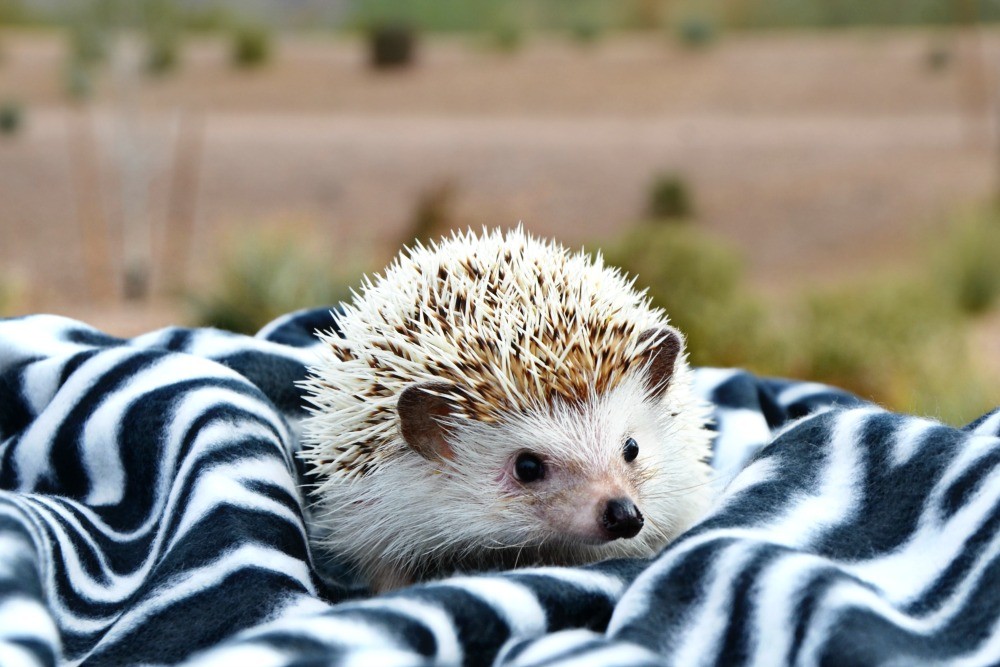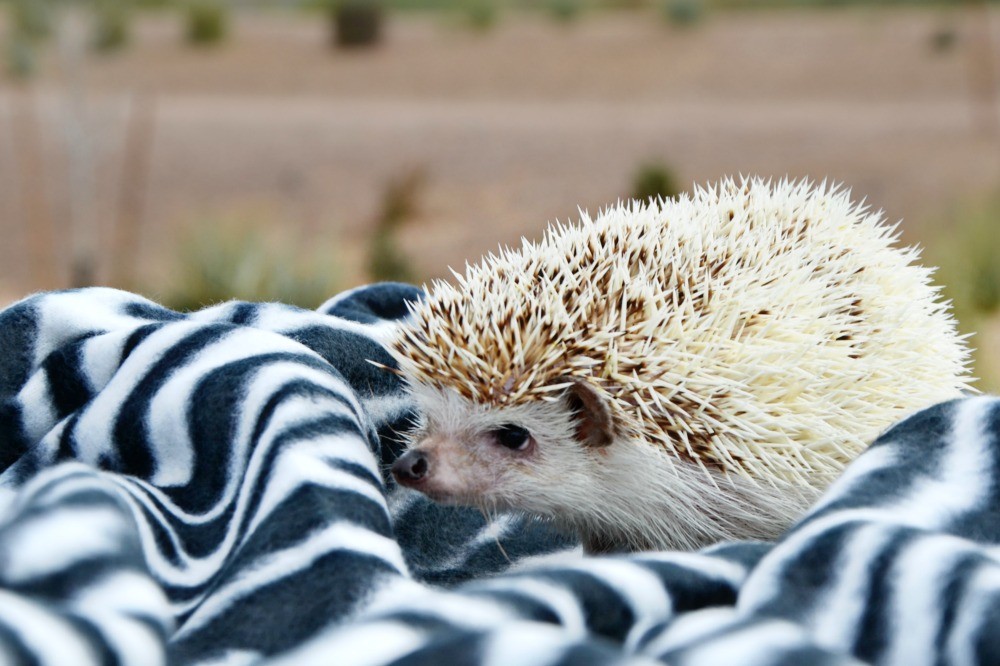Considering a prickly pal? How Much Are Hedgehogs As Pets? This guide from PETS.EDU.VN breaks down hedgehog costs, care, and if they’re right for you, offering solutions to help you make an informed decision. Explore the captivating world of hedgehog ownership with us, covering everything from initial expenses to ongoing care and potential health considerations, offering expert advice on hedgehog care and responsible pet ownership.
1. Understanding the Appeal of Hedgehogs as Pets
Hedgehogs, with their endearing snouts and captivating quills, have become increasingly popular as pets. But before welcoming one into your home, it’s crucial to understand what makes them so appealing and whether they align with your lifestyle. Hedgehogs are solitary creatures by nature. Unlike dogs or cats, they don’t require constant companionship. This can be a significant advantage for individuals or families with busy schedules. However, they do need daily interaction to maintain a bond with their owners and prevent them from becoming overly defensive. Hedgehogs are also relatively quiet pets. While they may make some noise at night while running on their wheel, they won’t bark or meow, making them suitable for apartment living or households sensitive to noise.
1.1. What Makes Hedgehogs Unique Pets?
Their unique appearance sets hedgehogs apart from other common pets. Their bodies are covered in thousands of quills, which they use for defense. When threatened, they curl into a ball, protecting their soft underbelly. Hedgehogs are also intelligent and curious animals. They enjoy exploring their surroundings and can be trained to perform simple tricks. They are also relatively low-maintenance pets compared to dogs or cats. They don’t require walks or extensive grooming, making them a good option for people with limited time.
1.2. Hedgehog Temperament and Personality
Each hedgehog has a unique personality, some are shy and reserved, while others are bold and outgoing. With consistent, gentle handling, they can become quite tame and enjoy interacting with their owners. Some hedgehogs even enjoy being held and petted. It’s essential to approach a new hedgehog with patience and understanding, allowing them to acclimate to their environment and learn to trust you.
2. Initial Costs of Owning a Hedgehog
The initial cost of acquiring a hedgehog is just the tip of the iceberg. Setting up a suitable habitat and stocking it with the necessary supplies will add to the upfront expenses.
2.1. Hedgehog Purchase Price
The cost of a hedgehog can vary depending on the breeder, location, and the hedgehog’s lineage. On average, you can expect to pay between $150 and $300 for a hedgehog.
| Factor | Price Range |
|---|---|
| Breeder | $200-$300 |
| Pet Store | $150-$250 |
| Rescue/Adoption | $50-$150 |




It’s important to research breeders and choose one who is reputable and prioritizes the health and well-being of their animals.
2.2. Setting Up the Habitat: Cage, Bedding, and Accessories
A proper habitat is crucial for a hedgehog’s health and happiness. A suitable cage should be at least 2′ x 3′ and have a solid bottom to protect their feet. Avoid wire-bottomed cages, as they can cause injuries. The cage should also have good ventilation to prevent the buildup of ammonia from urine. Bedding is another essential component of the habitat. It should be absorbent, dust-free, and safe for hedgehogs. Recommended bedding options include:
- Fleece liners: Soft, washable, and reusable.
- Paper-based bedding: Absorbent and dust-free.
- Wood shavings: Avoid cedar and pine shavings, as they can be harmful.
In addition to a cage and bedding, you’ll also need to provide your hedgehog with:
- A food bowl: A shallow, sturdy bowl that is easy to clean.
- A water bottle or bowl: A water bottle is generally preferred, as it prevents the water from becoming contaminated.
- A hiding place: A small house or igloo where your hedgehog can feel safe and secure.
- An exercise wheel: A solid-surface wheel is essential for hedgehogs to exercise and prevent obesity.
- Toys: Hedgehogs enjoy playing with toys such as balls, tunnels, and toilet paper tubes.
2.3. One-Time Veterinary Checkup Costs
After acquiring a hedgehog, it’s important to take it to a veterinarian for a checkup. The veterinarian will examine your hedgehog for any signs of illness and provide you with information on proper care. The cost of a veterinary checkup for a hedgehog typically ranges from $50 to $100.
3. Ongoing Costs of Hedgehog Ownership
Beyond the initial expenses, there are recurring costs associated with hedgehog ownership that you need to factor into your budget.
3.1. Food and Water Expenses
Hedgehogs are insectivores and require a diet high in protein and low in fat. High-quality cat food is a common staple in their diet. Supplementing with insects like mealworms and crickets is also essential for their nutritional needs.
| Food Type | Monthly Cost |
|---|---|
| High-Quality Cat Food | $10-$20 |
| Mealworms/Crickets | $5-$15 |
| Fruits/Vegetables | $5-$10 |
Fresh, clean water should always be available to your hedgehog.
3.2. Bedding Replacement Costs
Bedding needs to be replaced regularly to maintain a clean and healthy environment for your hedgehog. The frequency of replacement will depend on the type of bedding you use and how messy your hedgehog is. On average, you can expect to spend $10 to $30 per month on bedding.
3.3. Veterinary Care and Potential Health Issues
Hedgehogs are prone to certain health issues, such as obesity, dental disease, and mites. Regular veterinary checkups are essential for early detection and treatment of these problems. The cost of veterinary care for a hedgehog can vary depending on the issue, but you should budget for at least $100 to $200 per year.
3.4. Additional Supplies: Toys, Cleaning Products, and More
Hedgehogs need mental stimulation to stay happy and healthy. Providing them with a variety of toys and rotating them regularly will help keep them entertained. You’ll also need to purchase cleaning products to keep their cage clean and prevent the spread of disease. The cost of these additional supplies can vary, but you should budget for at least $10 to $20 per month.
4. Unexpected Costs to Consider
While you can plan for many of the costs associated with hedgehog ownership, there are some unexpected expenses that may arise.
4.1. Emergency Veterinary Visits
Hedgehogs can get sick or injured unexpectedly, requiring an emergency veterinary visit. These visits can be expensive, often costing several hundred dollars. It’s a good idea to have a pet emergency fund to cover these costs.
4.2. Travel and Pet-Sitting Expenses
If you plan to travel, you’ll need to find someone to care for your hedgehog. This could involve hiring a pet-sitter or boarding your hedgehog at a pet care facility. These services can cost $15 to $30 per day.
4.3. Cage Upgrades and Replacements
Hedgehogs may outgrow their cages or damage them over time, requiring you to purchase a new cage. The cost of a new cage can range from $50 to $200.
5. Are Hedgehogs High-Maintenance Pets?
The level of care required for a hedgehog falls somewhere in the middle compared to other common pets. They require more attention than a fish but less than a dog.
5.1. Time Commitment for Daily Care
Daily care for a hedgehog includes:
- Feeding and providing fresh water.
- Cleaning the cage.
- Providing playtime and interaction.
This takes approximately 30 minutes to an hour per day.
5.2. Cleaning and Hygiene Requirements
Hedgehogs need their cages cleaned regularly to prevent the buildup of bacteria and odors. Spot cleaning should be done daily, and a thorough cleaning should be done weekly. You’ll also need to bathe your hedgehog occasionally to keep its quills clean.
5.3. Social Interaction and Bonding
Hedgehogs need daily interaction to bond with their owners and prevent them from becoming withdrawn and defensive. This can involve handling, petting, and playing with your hedgehog.
6. The Importance of a Balanced Diet
A balanced diet is essential for a hedgehog’s health and well-being. It should consist of high-quality cat food, insects, and small amounts of fruits and vegetables.
6.1. Recommended Hedgehog Food Options
High-quality cat food should be the primary component of a hedgehog’s diet. Look for a food that is high in protein (30-35%) and low in fat (10-15%).
| Food Type | Protein (%) | Fat (%) |
|---|---|---|
| Chicken-Based Cat Food | 32 | 14 |
| Insect-Based Cat Food | 35 | 12 |
Insects are an important source of protein and nutrients for hedgehogs. Mealworms, crickets, and waxworms are all good options. Fruits and vegetables can be offered in small amounts as treats.
6.2. Treats and Supplements: What’s Safe and Healthy?
While treats can be a fun way to bond with your hedgehog, it’s important to choose healthy options. Avoid sugary or processed treats. Safe and healthy treats include:
- Small pieces of cooked chicken or turkey.
- Scrambled eggs.
- Cooked sweet potato.
- Blueberries.
Supplements are generally not necessary if your hedgehog is eating a balanced diet. However, if your veterinarian recommends a supplement, be sure to follow their instructions carefully.
6.3. Foods to Avoid
Certain foods are toxic to hedgehogs and should be avoided:
- Chocolate.
- Grapes and raisins.
- Onions and garlic.
- Avocado.
- Milk and dairy products.
7. Creating the Ideal Hedgehog Habitat
A proper habitat is crucial for a hedgehog’s physical and mental well-being. It should be spacious, secure, and stimulating.
7.1. Cage Size and Material Recommendations
The minimum cage size for a hedgehog is 2′ x 3′. The cage should have a solid bottom to prevent injuries and good ventilation to prevent the buildup of ammonia. Avoid wire-bottomed cages, as they can cause foot problems.
7.2. Bedding Options and Their Pros and Cons
- Fleece liners: Soft, washable, and reusable. Can be expensive upfront, but cost-effective in the long run.
- Paper-based bedding: Absorbent and dust-free. Can be dusty and may not control odors as well as other options.
- Wood shavings: Affordable and absorbent. Avoid cedar and pine shavings, as they can be harmful.
7.3. Enrichment Items: Wheels, Toys, and Hiding Places
Hedgehogs need enrichment items to stay happy and healthy. An exercise wheel is essential for preventing obesity. Solid-surface wheels are the safest option, as they prevent injuries. Toys such as balls, tunnels, and toilet paper tubes can also provide entertainment. A hiding place, such as a small house or igloo, will help your hedgehog feel safe and secure.
8. Hedgehog Health: Common Issues and Prevention
Hedgehogs are prone to certain health issues, but many of these can be prevented with proper care.
8.1. Common Health Problems in Hedgehogs
- Obesity: Caused by overfeeding and lack of exercise.
- Dental disease: Caused by poor diet and lack of dental care.
- Mites: Parasites that cause itching and skin irritation.
- Wobbly Hedgehog Syndrome (WHS): A progressive neurological disease.
- Cancer: Hedgehogs are prone to certain types of cancer.
8.2. Recognizing Signs of Illness
It’s important to be able to recognize the signs of illness in your hedgehog so you can seek veterinary care promptly. Some common signs of illness include:
- Loss of appetite.
- Lethargy.
- Diarrhea or constipation.
- Difficulty breathing.
- Skin problems.
- Changes in behavior.
8.3. Preventative Care Tips
- Feed your hedgehog a balanced diet.
- Provide plenty of exercise.
- Clean the cage regularly.
- Take your hedgehog to the veterinarian for regular checkups.
- Be aware of the signs of illness and seek veterinary care promptly.
9. Hedgehog Behavior and Training
Understanding hedgehog behavior is essential for building a strong bond with your pet.
9.1. Understanding Hedgehog Body Language
Hedgehogs communicate through a variety of body language cues. Some common cues include:
- Hissing: A sign of fear or annoyance.
- Popping: A sign of curiosity.
- Quill erection: A sign of defensiveness.
- Ball curling: A sign of fear or stress.
9.2. Taming and Handling Techniques
Taming a hedgehog requires patience and gentle handling. Start by offering your hedgehog treats from your hand. Once your hedgehog is comfortable taking treats from you, you can start to gently pick it up. Support its body with both hands and avoid squeezing it.
9.3. Basic Training and Enrichment Activities
Hedgehogs can be trained to perform simple tricks using positive reinforcement. Start by rewarding your hedgehog with a treat when it performs the desired behavior. Enrichment activities, such as puzzle toys and foraging opportunities, can also help keep your hedgehog mentally stimulated.
10. Legal and Ethical Considerations
Before acquiring a hedgehog, it’s important to consider the legal and ethical implications of owning one.
10.1. Legality of Hedgehog Ownership in Your Area
Hedgehog ownership is legal in most states in the United States, but there are some exceptions. Be sure to check your local laws before acquiring a hedgehog.
10.2. Ethical Sourcing and Responsible Breeding
It’s important to source your hedgehog from a reputable breeder who prioritizes the health and well-being of their animals. Avoid purchasing hedgehogs from pet stores, as they often come from unethical breeding facilities.
10.3. Hedgehog Abandonment and Rescue Options
Hedgehogs are often abandoned when owners realize they are not prepared for the commitment of caring for one. If you are no longer able to care for your hedgehog, contact a local hedgehog rescue organization.
11. Hedgehog as Pets for Children
Hedgehogs can be wonderful pets for children, but it’s important to consider the child’s age and maturity level.
11.1. Age Appropriateness and Supervision
Hedgehogs are not suitable pets for young children. They require gentle handling and can be easily injured by rough play. Children over the age of 10 may be able to care for a hedgehog with adult supervision.
11.2. Teaching Children Responsibility and Empathy
Caring for a hedgehog can teach children responsibility and empathy. They will learn how to feed, clean, and care for another living being.
11.3. Potential Risks and Safety Precautions
Hedgehogs have sharp quills and can transmit salmonella. It’s important to teach children how to handle hedgehogs safely and to wash their hands after handling them.
12. Finding a Reputable Hedgehog Breeder
Choosing a reputable breeder is essential for ensuring that you get a healthy and well-socialized hedgehog.
12.1. Questions to Ask a Breeder
- How long have you been breeding hedgehogs?
- What is your breeding philosophy?
- Do you health test your hedgehogs?
- Can I see the parents of the hedgehog?
- Do you offer a health guarantee?
12.2. Red Flags to Watch Out For
- The breeder is unwilling to answer your questions.
- The breeder does not allow you to see the parents of the hedgehog.
- The breeder does not offer a health guarantee.
- The breeder keeps their hedgehogs in unsanitary conditions.
12.3. Adoption and Rescue Options
Consider adopting a hedgehog from a rescue organization. This can be a rewarding experience and can give a deserving hedgehog a loving home.
13. Grooming Your Hedgehog
While hedgehogs are relatively low-maintenance pets, they do require some grooming.
13.1. Quill Care and Maintenance
Hedgehog quills are self-cleaning, but they may occasionally need to be cleaned. You can clean your hedgehog’s quills by gently wiping them with a damp cloth.
13.2. Bathing Techniques and Frequency
Hedgehogs should only be bathed when necessary. Over-bathing can dry out their skin. When bathing your hedgehog, use a mild shampoo and avoid getting water in their eyes and ears.
13.3. Nail Trimming and Ear Cleaning
Hedgehog nails need to be trimmed regularly to prevent them from becoming overgrown. You can trim your hedgehog’s nails using small animal nail clippers. Be careful not to cut the quick, which is the pink part of the nail. You can clean your hedgehog’s ears using a cotton swab. Be careful not to insert the swab too far into the ear canal.
14. Understanding Hedgehog Hibernation
Hedgehogs are capable of hibernating, but it’s not recommended for pet hedgehogs.
14.1. Why Hibernation is Dangerous for Pet Hedgehogs
Pet hedgehogs are not adapted to survive hibernation. They can become dehydrated and malnourished, which can lead to death.
14.2. Maintaining a Consistent Temperature
To prevent your hedgehog from attempting to hibernate, it’s important to maintain a consistent temperature in their environment. The ideal temperature range for hedgehogs is 72-80 degrees Fahrenheit.
14.3. Signs of Hibernation Attempt and What to Do
If your hedgehog shows signs of attempting to hibernate, such as lethargy, loss of appetite, and cold to the touch, warm it up gradually and offer it food and water. If your hedgehog does not improve, contact your veterinarian.
15. Hedgehog Lifespan and End-of-Life Care
The average lifespan of a pet hedgehog is 3-5 years.
15.1. Factors Affecting Lifespan
- Genetics
- Diet
- Exercise
- Veterinary care
15.2. Recognizing End-of-Life Signs
- Loss of appetite
- Lethargy
- Difficulty breathing
- Seizures
- Tumors
15.3. Providing Comfort and Veterinary Assistance
If your hedgehog is nearing the end of its life, provide it with a comfortable and quiet environment. Consult with your veterinarian about pain management options and end-of-life care.
16. Where to Learn More About Hedgehog Care
PETS.EDU.VN is dedicated to providing comprehensive and reliable information about hedgehog care. Our team of experts is passionate about helping you provide the best possible life for your prickly friend.
16.1. Online Resources and Communities
PETS.EDU.VN offers a wealth of information on hedgehog care, including articles, guides, and forums where you can connect with other hedgehog owners. We also recommend checking out reputable online resources and communities dedicated to hedgehog care.
16.2. Books and Guides
There are many excellent books and guides available on hedgehog care. These resources can provide you with in-depth information on all aspects of hedgehog ownership.
16.3. Veterinary Professionals
Your veterinarian is your best resource for information on hedgehog health. They can provide you with personalized advice on diet, exercise, and preventative care.
17. Success Stories: Happy Hedgehogs and Their Owners
At PETS.EDU.VN, we love hearing stories about happy hedgehogs and their owners. These stories inspire us and remind us why we are so passionate about providing information on hedgehog care.
17.1. Real-Life Examples of Successful Hedgehog Ownership
“I am absolutely in love with my daughter’s pet hedgehog. I had no idea how much joy these little creatures could bring. Skittles the hedgehog is funny and playful and shares an incredible bond with my daughter. She is now fully responsible for taking care of her hedgehog all by herself, and it makes my heart melt to see their special bond.” – Sarah J.
17.2. Lessons Learned and Tips Shared by Experienced Owners
“Patience is key when it comes to taming a hedgehog. Start by offering treats from your hand and gradually work your way up to handling them. With consistent effort, you can build a strong bond with your prickly friend.” – Michael B.
17.3. The Unique Bond Between Hedgehogs and Their Human Companions
“There’s nothing quite like the feeling of a hedgehog snuggling up to you. Despite their quills, they can be incredibly affectionate and loving pets. It’s a truly special bond.” – Emily K.
18. Alternatives to Hedgehog Ownership
If you’re not sure if a hedgehog is the right pet for you, there are other small animals that may be a better fit.
18.1. Other Small Pet Options
- Hamsters
- Guinea pigs
- Rats
- Mice
- Gerbils
18.2. Comparing Costs, Care Requirements, and Temperaments
Each of these animals has its own unique set of costs, care requirements, and temperaments. Research each animal carefully to determine which one is the best fit for you.
18.3. Making the Right Choice for Your Lifestyle
Choosing a pet is a big decision. Be sure to consider your lifestyle, budget, and the amount of time you can dedicate to caring for your pet.
19. Debunking Common Hedgehog Myths
There are many myths and misconceptions about hedgehogs. Let’s set the record straight.
19.1. Addressing Misconceptions About Hedgehog Behavior
- Myth: Hedgehogs are aggressive.
- Reality: Hedgehogs are generally shy and defensive, but they can be tamed with gentle handling.
- Myth: Hedgehogs are dirty.
- Reality: Hedgehogs are clean animals, but they do need their cages cleaned regularly.
- Myth: Hedgehogs are nocturnal.
- Reality: Hedgehogs are crepuscular, meaning they are most active at dawn and dusk.
19.2. Separating Fact from Fiction
It’s important to rely on accurate information when making decisions about hedgehog care. Avoid relying on anecdotal evidence or unverified sources.
19.3. Promoting Responsible Hedgehog Ownership
By debunking common myths, we can promote responsible hedgehog ownership and ensure that these animals are treated with the care and respect they deserve.
20. Final Thoughts: Is a Hedgehog the Right Pet for You?
Owning a hedgehog can be a rewarding experience, but it’s important to be prepared for the commitment.
20.1. Reviewing the Costs and Commitments
Before acquiring a hedgehog, review the costs and commitments associated with ownership. Be sure that you are prepared to provide your hedgehog with a proper habitat, a balanced diet, regular veterinary care, and plenty of attention.
20.2. Considering Your Lifestyle and Capabilities
Consider your lifestyle and capabilities. Do you have the time and resources to care for a hedgehog properly? Are you prepared to handle a prickly animal that may be shy and defensive?
20.3. Making an Informed and Responsible Decision
Making an informed and responsible decision is essential for ensuring the well-being of both you and your hedgehog. If you are prepared for the commitment, a hedgehog can be a wonderful and rewarding pet.
We at PETS.EDU.VN understand the challenges of finding trustworthy information about pet care. We’re here to help Whether you’re curious about “how much are hedgehogs as pets” or need expert advice on hedgehog health, diet, or behavior, PETS.EDU.VN is your go-to source. Visit PETS.EDU.VN today for detailed guides, expert articles, and a supportive community. Still have questions? Contact us at 789 Paw Lane, Petville, CA 91234, United States or Whatsapp: +1 555-987-6543. Let pets.edu.vn be your partner in providing the best care for your prickly companion.
